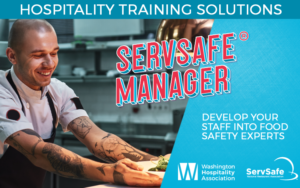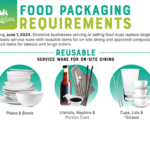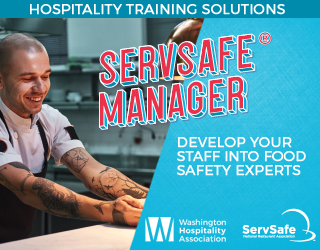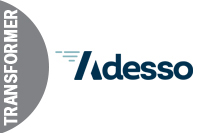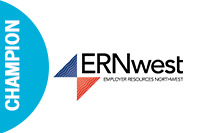
This toolkit is sponsored by:

*** Job posting lawsuits on the rise ***
Amendments to Washington’s Equal Pay Opportunity Act (EPOA) made in 2023 require employers with more than 15 employees to include specific information in any job postings: pay ranges, benefits, and other compensation. Not meeting strict requirements risks a lawsuit seeking $5,000 statutory damages or actual damages from any applicant – not just hired employees.
Be sure to check out this webinar from Catharine Morisset, an employment law attorney from Fisher Phillips, as she walked attendees through requirements and strategies to avoid class-action lawsuits surrounding this new law and other job posting rules.
The workforce shortage is poised to be one of the biggest challenges for the hospitality industry in the next five years.
This toolkit is designed to give you ideas that could help bring employees back to the hospitality industry.
Industry job boards
It’s no secret that employers in the hospitality industry are having a hard time finding workers. With the ongoing labor shortage impacting almost everybody, the resources to help you find them shouldn’t be a secret as well. Click here for a list of quality, relevant online job boards and employment resources for hospitality businesses.
Dip into nontraditional talent pools with diverse leadership
According to the Bureau of Labor Statistics, women make up 51.2% of the workforce in the hospitality sector—one of a handful of industries where women are a majority. Despite this level of representation, the upper ranks of hospitality leadership look much different. Only 30% of leaders in the sector are women; for every female chief officer, there are three men with the title. Read more.
Applications
A simple way to look at the early stages of the hiring process is to remember the following: A great job post should tell people what they will be doing, not what you are looking for. The point of contact for the applicant should be the superior they work with the most, and you should treat each candidate like you would treat a potential business partner. Using those guidelines will set you up to have the candidate come looking for you.
DHS Makes Changes to the Streamlined Form I-9
Federal immigration officials just made critical changes to modernize the I-9 employment verification process, not only announcing a new I-9 Form but providing remote verification flexibility for qualified employers that use E-Verify. The Department of Homeland Security announced on July 21 that the long-awaited new Form I-9 will be available for employers to use on August 1 – and that all employers must use the new form by November 1. Here are eight best practices for compliance given the new rules soon in effect.
Replay: All Things HR – How to recruit & retain great employees
Recruiting like a marketer
Help wanted signs, and Craigslist ads don’t measure up. Countless hours and resources have been invested to perfect marketing strategies that work. Attracting customers and attracting talent are remarkably similar. How can we co-opt these developed strategies toward restaffing?
Benefits
Your employees may be looking for various benefits to accompany their job. We have partners who offer low-cost or free-to-you benefits.
- Telemedicine: Employees can have virtual access to medical professionals and prescriptions.
- Mental health services: Employees can access mental health professionals, including crisis text lines, substance abuse helplines and access to Sanvello, an app for stress, anxiety and depression.
- Hospitality Health Insurance: Hospitality Health Insurance is designed to give small employers access to affordable medical plans and flexible spending accounts.
- Employee Assistance Program (EAP): Employees can receive help for marital problems, stress, job pressure, grief and loss, substance abuse and more.
- Passport Unlimited: As Washington Hospitality Association members, you and your employees can access this program that connects you with discounts at local and national chains.
- Pharmacy discounts
- Commuter benefits
Reach out to your territory manager for more information about these programs.
Articles
- As labor shortage drags on, employers can find long-term solutions overseas
- Four-day workweek study hints at promising results
- Culture can help restaurants recruit and retain workers, CREATE panelists say
- The price of burnout is high, but employers are overlooking a simple cause
- How to get workers to stick around
- How to keep talent past the first three days
How to use ESD’s SharedWork program to get your employees back to work
Finding employees to work is now the industry’s top challenge. Even before the pandemic, there was a labor shortage. You’ve been wondering how to get your employees back to work. One way to do that is to share your employee’s wages with the Employment Security Department. Read more about the ESD’s SharedWork program.
AHLA Diversity & Inclusion Report
The AHLA Foundation made a five-year, $5 million pledge to help this industry progress diversity at all levels. The AHLA has worked with BW Research to survey AHLA members representing over 250,000 employees across 1,800 locations. Please see the full report and the related infographic.
Culture & staff engagement
People don’t leave their jobs; they leave their bosses. A 2019 cross-industry workplace study learned that 94% of responders stay longer in jobs where they feel recognized, valued and invested. Turnover is expensive: the average cost-per-restaurant-employee is more than $5,000. Find out more here.
NW Hospitality Leadership Podcast
This podcast series discusses the books of Patrick Lencioni, the founder of Table Group, which specializes in organizational health. Learn how to change your business’ culture for the better to attract new employees: in each episode, Washington Hospitality Association President & CEO Anthony Anton discusses one of Lencioni’s books with Chris Jenson of the Table Group and hospitality leaders from Washington And Oregon. You can find the complete series here or wherever you get your podcasts. Sponsored by U.S. Bank.
Teen labor
As we look to find new ways to overcome our labor shortage, many operators are turning to a demographic that hasn’t received as much attention from the industry in recent years – teenagers. While the association doesn’t recommend hiring 14- and 15-year-old workers, the rules for 16- and 17-year-olds are a little more flexible.
Employers need to have an updated Parent Authorization for Summer Work on file for each team member who is under the age of 18. Businesses do not need to submit this form to L&I, but must have it on file if audited.
Note: If the minor continues employment into the school year, the employer must complete the Parent/School Authorization form by September 30 each year or when the work schedule changes.
The current workforce shortage is forcing many in the hospitality industry to rethink their approach to staffing. Even with Washington state fully reopened, it could take years for hospitality businesses to hire and retain enough staff to meet demand.
Prior to the pandemic, many small businesses had policies and practices in place that required employees be at least 18 years old. But in the face of the current workforce shortage, many employers are revisiting those policies and expanding job opportunities to more young workers.
There are several state laws and rules in place for employers who hire teen workers. The association’s HERO has all the information you need if you’re expanding your applicant pool to include those younger than 18.
The Washington State Department of Labor & Industries also has a wealth of resources for helping employers stay compliant with current state laws and rules related to teen workers. Those resources include age-specific work restrictions, required documentation, allowable work hours, and wage, meal & rest break requirements.
New laws
The government affairs team actively supported House Bill 1730, which allows 18 – 20-year-olds to work for 21 and older establishments, so long as the employee is not employed in any positions that include serving alcohol, food or interacting with patrons. In addition, they must work under a supervisor at least 21 years old. This will help us build our workforce as we look for employees. The bill included an emergency clause, which the governor vetoed.
Another bill the association supported during the 2023 legislative session was House Bill 1658. This bill allows high school students aged 16+ to receive elective credit for paid work experience in any industry. The student would need to work 360 hours per credit and could earn up to two credits. The Office of the Superintendent of Public Instruction (OSPI) will initiate rulemaking to implement paid work experience provisions. After the rules are approved, employers and students can participate in this program.
Check back here soon to find the rules when OSPI releases them.
CEO Podcast
Washington Hospitality Association President and CEO Anthony Anton talked about the many factors contributing to the labor shortage in the June 2021 episode of our CEO Podcast. Be sure to check out that replay here.
Anthony also discussed teen labor with OSPI Superintendent Chris Reykdal and Reed Simock, youth employment specialist at Labor & Industries, in the September 2022 episode of the CEO Podcast.
Documentation
Businesses that employ minors must obtain a minor work permit from the Department of Revenue. The business must also have an Industrial Insurance endorsement.
PARENT/GUARDIAN PERMISSION AND SCHOOL PERMISSION
Parent or guardian permission is needed to employ minors. You can download this parental permission form here for minors on summer break. Use this parent & school permission form for any minor also attending school during their employment.
PROOF OF AGE
Businesses must also keep proof of age for each minor on file. Acceptable documents include a copy of the following:
- Birth certificate and Social Security card
- Driver’s license
- Baptismal record
- Notarized statement from the parent or legal guardian
OTHER INFORMATION TO KEEP ON FILE
Maintain records of work schedules, rest breaks and meal breaks. It is strongly recommended that businesses keep timecards and work schedules. In the event of a wage claim, L&I industrial relations agents don’t count work schedules; they only count timecards.
Wages
Minor employees younger than 16 must be paid at least 85% of the state’s minimum wage. Employees 16 and older must be paid at least the current state minimum or local minimum wage where applicable.
Meal Breaks & Rest Periods
Employers must provide meal periods and rest breaks. The laws for minor workers are different for employees 18 and older.
14- and 15-year-old workers:
- May not work more than four hours without a 30-minute, uninterrupted meal break that is separate from and in addition to rest breaks.
- Must also be provided a paid rest break of at least 10 minutes for every two hours worked
16- and 17-year-old workers:
- May not work more than five hours without a 30-minute, uninterrupted meal break that is separate from and in addition to rest breaks.
- Must also be provided a paid rest break of at least 10 minutes for every three hours worked.
Since meal periods and rest breaks provide rest from work, they should not be scheduled near the beginning of a work shift.
Teen employee safety
Make sure your minor employees (and all your employees for that matter) understand how to work in a healthy and safe environment. Do your employees know the potential hazards of the job? Do they know who to ask with a question about safety?
Here are good safety questions you should make sure your employees can answer. And check out this list of prohibited job duties for young workers.
Danger of working around hot-oil fryers (Hazard Alert)
Aerosol cooking oil products can explode (Hazard Bulletin)
Additional resources
- National Restaurant Association: Tapping the teen market
- Business Insider: Teen employment could hit record highs in 2021 as US business owners flock to hire young workers in a tight labor market
- Bloomberg: Why Teenage Workers Are Leading the Recovery
- L&I: Employing teens under 18 in food service?
- L&I: Teens make great workers when employers help them develop quality work skills and safe work practices
- AIHA: Teen worker safety matters
- Erik Soper: The teen worker’s survival guide
- NIOSH Alert: Preventing deaths, injuries and illnesses of young workers
This information is current as of March 26, 2024.




